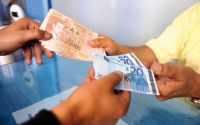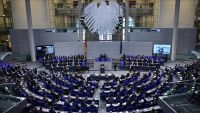Einstein is being invoked these days in Stockholm. His probably apocryphal saying that insanity is doing the same thing again and again while expecting different results has a special resonance in Swedish politics.
Stefan Löfven, the Social Democrat prime minister since October, has said that next week he will call snap elections to take place in March: it will be the first time a midterm vote has been held in more than half a century in a country renowned for its stability. Yet few expect a dramatically different outcome from the messy parliamentary situation created in September’s elections, when his centre-left coalition failed to secure a majority.
“Einstein might have wanted the doctors to examine Löfven,” says a former centre-right minister. “Snap elections are unheard of, unthought of. It’s a collapse of the current order.”
Opinion polls have given a small lead either to the governing centre left or the opposition centre right, in power from 2006 until October. But the anti-immigration Sweden Democrats, who triggered a government crisis by voting against Mr Löfven’s budget this month, still hold the balance of power and as none of the established parties are willing to co-operate with them, more deadlock is feared.
The debate on immigration has so far overshadowed everything before the new elections and is linked to the rising popularity of the Sweden Democrats, who are forecast to win 16-18 per cent of the vote by polls that underestimated their support before the September elections. But the biggest practical question is whether parties on the left or right are willing to co-operate over political borders to form some kind of grand coalition.
“For Sweden it’s really a disaster that we can’t find solutions. It gives the Sweden Democrats much more influence than the 13 per cent of votes [they received in September],” says Karl-Petter Thorwaldsson, head of the LO trade union congress and a member of the executive committee of the Social Democrats.
Unease about the Sweden Democrats has grown after a long series of controversies. Party secretary Björn Söder caused consternation last week when he said Jews, Samis and Kurds could have Swedish citizenship but should not be considered true Swedes unless they assimilated into Swedish society. That came shortly after the party introduced a proposal to record the nationalities of people in the criminal justice system.
Such a focus on ethnicity “has not been seen in Europe since 1945,” Mr Thorwaldsson says.
But the far-right party’s signature policy of cutting back immigration by 90 per cent has gained traction in Sweden, which takes more immigrants per head than any big European country with about 100,000 asylum seekers alone expected next year. After years of being shunned — largely because of the party’s roots in the neo-Nazi movement — there are signs that this stance is causing a change among the other parties, especially on the centre-right.
While none of the mainstream parties is close to breaching the cordon sanitaire which has frozen the Sweden Democrats out of coalition governments, it has sparked a national debate on whether the Nordic country should be slightly more restrictive on immigration.
Göran Hägglund, leader of the Christian Democrats, perhaps the most conservative of the four centre-right parties that make up the alliance that governed Sweden until October, said he was “tired of the fact that all discussions start and end with the Sweden Democrats”. He proposed reducing benefits to refugees and offering them temporary, rather than permanent, residence permits.
Other centre-right parties may follow suit. A former minister from the Moderates — the country’s second-biggest party behind the Social Democrats — says integration of refugees is a growing problem with many on both sides complaining of segregation. “You will see increasing differences between the parties,” he adds.
The centre left has criticised the weakening of the previously liberal consensus on immigration with Mr Löfven saying it risked “playing into the hands of the Sweden Democrats”, a party he has branded as “neo-fascists”.
This divergence has played into the heated rhetoric between the two mainstream camps, with Mr Löfven saying he had “lost his patience” with the right. Rightwing leaders complain that the prime minister merely wants their support to prop up a leftwing government.
Mr Thorwaldsson hopes that the left and right can do a deal. But the LO leader, who caused a stir when he told the Financial Times in August that the political situation was “like sitting in a bath full of gasoline and looking for the matches”, says there is still plenty of danger around the new elections. “We are sitting in the same bath tub looking for the matches,” he says.
Financial Times
![]()









